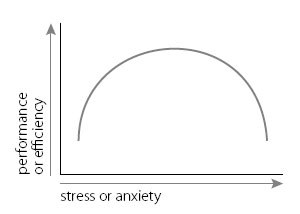Create Balance: Living Well in the Midst of Anxiety
We think anxiety is “bad” in our culture, and that it needs to be alleviated. We may think something is wrong with us if we experience anxiety. Fortunately, about a hundred years ago, two Harvard physicians found that anxiety served an important place in our ability to function well. (Yerkes & Dodson, 1908).
They found that performance is directly correlated to level of arousal. When we have little or no arousal, we are bored and perform poorly at complex tasks. On the other hand, when we are extremely stressed and overwhelmed, we find it difficult to function altogether. The optimal level of stress, anxiety, or arousal is somewhere in the middle of both extremes.
Take, for example, preparing for a test. If we feel unchallenged or bored, we may not feel motivated to study, and will likely put it off until the night before. If, on the other hand, we feel intense anxiety about the test, we may find it difficult to focus, and may even blank out while taking the test. The optimal approach is somewhere in the middle. This means that a moderate amount stress is actually beneficial to help us study and stay focused on the task. Or to put it simply: Balance.
For those who struggle with too much anxiety, here are some helpful tools that can bring down the level to a more desirable level. Remember, the goal is not to get rid of stress; some stress is helpful.
- Call someone you trust. Anxiety diminishes when we share our struggles with another person who hears us with compassion.
- Practice deep breathing: There are a number of deep breathing exercises on YouTube. A local Yoga class is also a good place to practice healthful breathing exercises.
- Exercise is a natural relaxer, and large muscle movement stimulates and calms the brain.
- Notice self-talk: When we are overly self-critical, we increase our level of stress and anxiety. Catch self-critical talk, and begin to respond internally with kindness and compassion.
If you feel overwhelmed and your anxiety level makes it difficult for you to focus, please contact Fuller Life Family Therapy so that we can work together to lessen your anxiety and create more balance in your daily life.
Yerkes, R. M. & Dodson, J. D. (1908). The Relation of Strength of Stimulus to Rapidity of Habit-Formation. Journal of Comparative Neurology and Psychology, 18, 459-482.











